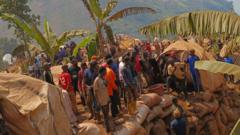The Rubaya coltan mine in eastern Democratic Republic of Congo has recently come under the spotlight as it remains a crucial site for mobile phone manufacturing. Soldiers from the M23 rebel group have granted exclusive access to the BBC to illustrate the daily realities faced by over 10,000 miners who work tirelessly in this vital industry. The landscape is dotted with individuals laboring in various capacities—some extracting ore deep underground, while others wash and sort the rock that contains coltan, essential for numerous technological devices.
Patrice Musafiri, the site supervisor since M23's takeover in April 2022, emphasizes that understanding the treacherous conditions is essential for outsiders. Navigation is perilous, often requiring the use of walking sticks, and the dangers of high temperatures and noxious gases add to the difficulties miners face. Yet, many find pride in their work, as the income allows them to support their families and improve their living standards. Miner Peter Osiasi relayed how mining has transformed his life positively over five years, enabling him to save for personal milestones.
Located in North Kivu province, Rubaya is perched in an area filled with potential, accounting for about 15% of the global coltan supply. The international interest in this region is amplified by its history of conflict, wherein rich resources have fueled competition among numerous armed factions. Recent ceasefire negotiations have raised hopes for a more stable future, yet the precarious situation remains exacerbated by tensions involving Rwanda and accusations of external meddling.
During the BBC's visit, tension was palpable but no immediate threats were apparent. According to Musafiri, security measures have improved, with a structured department established to oversee mining operations, enforce safety regulations, and mediate local disputes. Though peace is fragile, miners in Rubaya report a noticeable uptick in business activity, albeit with frustrations over meager wages.
With American investment on the horizon, there is a cautious optimism about boosting local development efforts. Tumsifu, a political analyst, believes American interests could act as a mitigating force against returning violence, but there remains uncertainty about how these investments would interface with the M23's influence over Eastern Congo.
While discussions continue about the long-term management of resources and peacebuilding, local community members like Osiasi persist in their calls for improvement. As he returned to his labor, he implored leaders to prioritize stability and fair compensation, embodying the paradox of wealth amidst poverty that characterizes the ongoing struggles in the region.


















